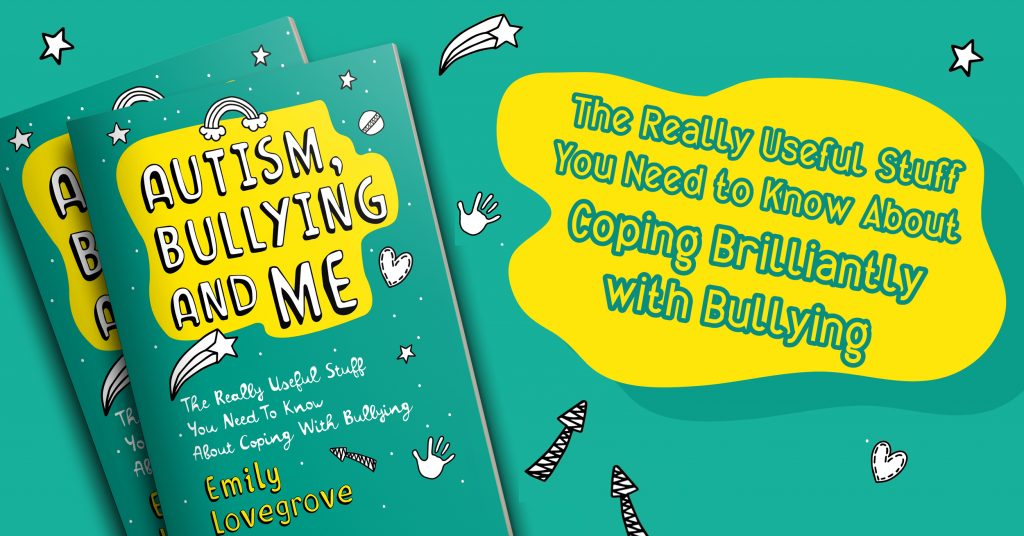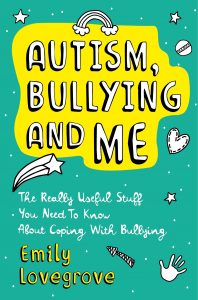Dr Emily Lovegrove – aka The Bullying Doctor – has written this accessible guide for autistic children and teens, full of advice for coping successfully with bullying. It helps the reader understand what bullying is and debunks myths such as ‘bullying makes you stronger’. It also lays out self-empowering strategies and practical tips on how to deal with situations where they are being bullied.

I was constantly rebuked, as a child, with “Why can’t you be normal?” My parents, staunch pillars of the Methodist community, used threats, beatings and withholding food and freedom to change me. To no avail. I thought I was normal. I just thought everyone else was… well… weird. I didn’t understand their ‘rules’. I thought them bizarre and illogical.
At primary school I kept to myself, but at secondary school I did eventually make a best friend – who bullied me. Nonetheless I much preferred this to being on my own.
It wasn’t until, in middle-age, when I went to university to study psychology, that I realised that most people could be predicted to act / react in a similar way. But that still left a lot of individuals who acted and reacted, like me, in different ways. I began to look at what exactly normal is. And found that there is no such thing! There is simply average. And that transformed how I felt about everything. (And eventually led to my seeking confirmation that I was a perfectly normal autistic.)

After my science degree I was offered a funded PhD, looking at how appearance affects adolescents. Unsurprising to me, teens in a huge variety of schools confided (in interviews and questionnaires) that they feared being in any way different as this usually resulted in teasing… and then bullying. Interestingly what they most wanted was not revenge, but popularity! This meant that standard adult responses like ‘Just tell an adult’ that resulted in the punishment / humiliation of the perpetrator – who then frequently ‘got their own back’ – were rarely effective. We spent a lot of time examining what we thought bullying was – and the myths that surround it, like ‘bullying makes you stronger’ (it doesn’t – feeling bullied, or watching others get bullied – can affect your whole life negatively).
We discovered that what these teens really wanted was self-empowerment!
Although I now had enough information to complete my PhD, I was intrigued. What might help with this problem? I looked into the research with those who are disfigured – either congenitally, from surgery, or from an accident – and examined how they are encouraged to cope with looking different and sometimes being viewed negatively. I then took the strategies devised for this population back to those hundreds of teens being bullied and together we worked and experimented on which strategies were particularly helpful to them – and why. Needing to validate this scientifically, I taught endless groups of teens the revised list of strategies with them filling in questionnaires before, after, and at six months later.
Rewardingly there were significantly marked positive differences! Once they had a variety of strategies to use for themselves, they declared they were not only more likely to ignore a lot of minor bullying, but also much more confident about insisting their concerns were heard and dealt with if the bullying was serious.
This book, Autism, Bullying and Me, is the book I needed when I was a teenager (and, if I’m honest, as an adult too)! Based on those years of research on difference and bullying, I began to engage with individuals in the autistic teenage community, as a therapist. Again, we looked at all those anti-bullying strategies. And again, we experimented – what was particularly helpful, given that many of us struggle to name our emotions and are often hugely sensitive to various things like touch, taste, light, sound? It turned out we may take a little longer, we may be more vulnerable to bullying, and we may do things differently… but essentially the strategies still worked. Autistic children and teens too felt that need for self-empowerment. And I think having an autistic adult to help them was also key!

Practising dealing positively and successfully with aggressive behaviours changes the way that we view the world. It helps to stop ‘black and white thinking’ (they are wrong, I am right) and ‘catastrophising’ (I am never going to find a friend). Knowing we can do this forms a solid basis for higher self-esteem.
There’s lots of info in this book on what bullying is – and what advice really isn’t helpful! Such as can you really ‘Just ignore’ bullying? (No, because your body has a natural stress reaction making absolutely sure you are about to react in one way or another!) There’s stuff on how and why bullying starts, and how being seen as different in any way can affect whether we are more likely to attract that negative attention.
It encourages examining any black and white thinking, looking at how others might be feeling, and understanding how we get stuck in negative patterns of thought and behaviour. It also includes things like short meditations to ‘unstick’ ourselves! But most of all it shows that even if we thought it was impossible to change how some people behave towards us, it absolutely is possible. It just takes commitment to love and respect ourselves, to ensure that others recognise we are a vital part of all those individual, not-average-but-normal humans that make up our diverse society.
Find out more about Autism, Bullying and Me.
If you would like to read more articles like this and get the latest news and offers on our books about autism, why not join our mailing list? We can send information by email or post as you prefer. You may also be interested in liking our Autism, Asperger’s and related conditions Facebook page.